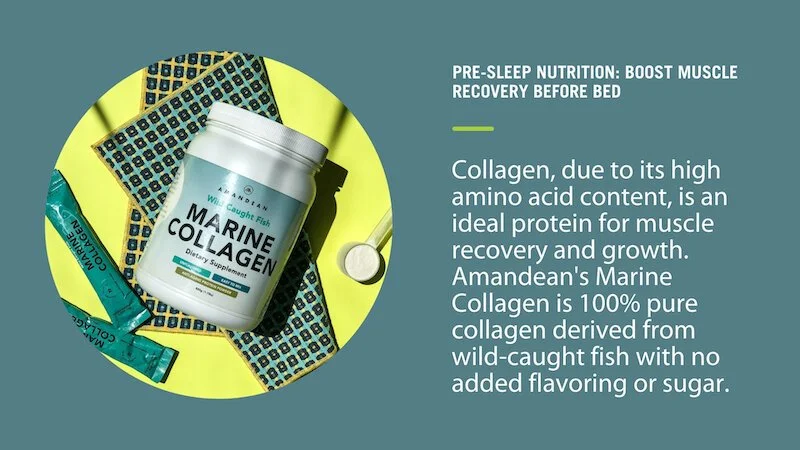Pre-sleep nutrition: Boost muscle recovery before bed
By Martin Ebner, Head PT and sports nutrition specialists at ebylife.
Sleep and recovery go hand in hand. Nothing is more restorative than a good night's rest. Athletes are no strangers to the "optimize everything" mentality that's often needed in the gym for optimal athletic performance and constant PR-shattering. Now, you may be able to optimize your sleep schedule and nighttime routine to improve your training sessions the next day without sacrificing sleep. Meet pre-sleep nutrition, your key to boosting overnight recovery and muscle growth.
Muscle Recovery and Sleep
Few athletes have a "sleep strategy" yet it's one of the most effective tools humans have to prevent injury, build muscle, and speed up recovery times. Sleep affects athletic performance in a number of ways. When the ideal amount of deep, restful REM sleep is achieved (7-8 hours of sleep per night, or 9 for elite athletes and high performers), reaction times, information processing, focus, pattern recognition, athletic performance, immune system regulation, and stress regulation are all improved because of it.
One study conducted on male basketball players measured athletic performance before and after increasing their nightly sleep to ten hours. As a result of an increase in nightly rest, the study found improvements in sprint times, free throw and three-point shot accuracy, and mental health. Another study conducted on both young men and women swimmers also measured improved reaction times and swim-sprint speeds after a 10 hour night of sleep per night.
Alongside diet and physical activity, sleep is another crucial element to muscle recovery and muscle building; the body is hard at work during sleep, even if you don't notice it. During sleep, the body releases up to 95% percent of its growth hormone, the key hormone needed to increase muscle growth, improve recovery and reduce muscle soreness. Hormones cortisol and testosterone are also secreted during sleep, which increases muscle protein synthesis rates and helps to boost your muscle gains overnight. Of course, sleep duration is not the only important measure of sleep. Sleep quality, usually measured by REM sleep duration, also impacts how rested your brain and body feel the next day. In short, 8 hours of quality sleep is better than 10 hours of shallow and interrupted sleep.
Nocturnal Nutrition for Increasing Muscle Mass
Adequate protein intake is another key marker of success when it comes to muscle building. While carbohydrates help to provide quick energy to the body, protein is considered the "muscle-building macronutrient" because it is needed to build and strengthen muscle fibers and improve muscle strength. I recommend eating a diet consisting of 1-2 grams of protein per kilo of body weight. In terms of a macronutrient split, this usually breaks down to around 40/30/30 - carbs to protein to fats.
Protein timing is important too. I always recommend taking a lean protein supplement 30 minutes before and after exercise training to support muscle tissue growth. However, some studies have pointed out that consuming pre-sleep protein supplementation may not only help to build muscle overnight, but it can also help to speed up muscle recovery and reduce soreness. Here's how it works.
When protein powders and supplements are consumed, they are broken down into the amino acids needed to support muscle growth. The specific amino acids may differ between protein supplements and sources, but in the case of collagen, one of my preferred protein sources, it is broken down into glycine, proline, and hydroxyproline. Glycine in particular is known to help build lean muscle mass and support the production of growth hormone. Two studies were done to measure the impact of pre-sleep protein ingestion. One study measured the muscle protein synthesis rates of young male athletes who consumed 40 grams of casein protein before bed to those who only consumed it immediately after a workout. In the end, the study provided evidence that "protein ingested immediately before sleep is effectively digested and absorbed, thereby stimulating muscle protein synthesis and improving whole-body protein balance during postexercise overnight recovery."
Another study monitored 44 young men during a 12-week resistance training program paired with a high protein diet. Half of the participants were given a protein shake before bed, and the other half were given a placebo. Ultimately, those who consumed the pre-sleep protein had greater improvements in muscle strength and muscle size. Greek yogurt, cottage cheese, nuts, avocado, eggs, chicken breast, and legumes are all great sources of dietary protein and make for a great protein-packed midnight snack. With that said, if you find that consuming large quantities of food immediately before bed disrupts your sleep or when bodybuilding and maximizing muscle growth is your goal, you may want to consider consuming a protein supplement instead.
If you're wondering how much protein is enough for your body type, lifestyle, and fitness goals, check out how to eat, train and supplement for your body type (men / women).
Related article: 10 Reasons why women should lift weights
I like to add a lean protein supplement to my water or plant-based milk alternatives (almond, rice, oat etc) before bed and during workouts to sharpen the results of my daily resistance exercises. Amandean's Premium Marine Collagen is one of the purest protein supplements on the market and one of my go-tos before the gym and before bed. Collagen, due to its high amino acid content, is an ideal protein for muscle recovery and growth. Whereas other collagen supplements are made with artificial ingredients and flavors, Amandean's Marine Collagen is 100% pure collagen derived from wild-caught fish. This helps to keep sugar and caloric intake low while adding 10g of protein to your water, decaf tea and coffee, or even oats before bed. Since collagen is a natural protein source for the body, it is safe to consume daily between 10g and 20g. Try to get your pre-sleep protein in one hour before bed to give your body the fuel it needs while keeping muscle restoration your body's main priority instead of digestion while sleeping.
GET 10% OFF AMANDEAN MARINE COLLAGEN WITH CODE: EBYLIFE10


